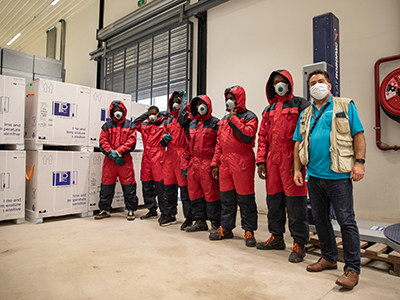Developed jointly by UNICEF and WHO, the Immunization eLearning Initiative provides all immunization staff with access to training in areas deemed vital to the advancement of the Global Vaccine Action Plan and its vision that everyone live a life free from vaccine preventable disease.
This learning programme on “Immunization Supply Chain Management” provides all immunization staff with a better understanding of the role strong immunization supply chain systems play to achieve the global immunization mission.
Through the improvement of a fictional country’s immunization supply chain, you will acquire the skills and know-how to identify problems and opportunities for improving the efficiency of the immunization supply chain, and plan for the introduction of new vaccines and campaigns.
Cover image: © UNICEF/UN0424997/Desjardins
Learning objectives
At the end of this course, you will be able to:
- Specify the links between immunization supply chains and the EPI program and the positive effects that strengthening supply chains has on health system strength and immunization coverage and equity;
- Identify the appropriate procedures for forecasting and procuring the right products (vaccines and immunization supplies), in the right quantities, using the most appropriate forecasting and procurement mechanism based on of the health needs of a particular country/region;
- Assist the EPI program in assessing immunization supply chain requirements, procuring and allocating the most appropriate cold chain equipment and in establishing systems to monitor and control vaccine temperatures throughout the cold chain;
- Determine how many vaccines to ship, when they should be shipped, and how they should be shipped using information about the current stocks in a given facility, balancing trade-offs and efficiencies between frequency and volume of supplies while ensuring maximum quality;
- Use key performance indicators (KPIs), dashboards, and various supply information systems to determine whether a supply system is operating optimally and, if not, to identify which aspects of the system require remediation;
- Specify how new vaccine introductions and campaigns/SIAs impact the supply chain and specify ways of optimizing the supply chain to accommodate such events.
Audience
This eLearning course is for all national and international World Health Organization (WHO) and UNICEF professionals involved in immunization programs. It is also open to consultants and partners working in support of immunization.
Course Duration
It should take ±3 hours to complete this course. Each module should take 20-35 minutes to complete and must be completed in the order presented.
Methodology
This learning programme takes the learner through a mission to a fictional country to assist in improving various elements of its immunization supply chain. These experiential lessons consist of challenges where he or she will meet different characters and address specific problems either at the national, regional or the district level.
Structure
This course is organized into one Introduction and 5 Challenges (modules):
Introduction: Mission preparation
Get a debrief by the Senior Immunization Advisor on the situation in Great Island. Meet with Laura, who will assist you throughout your mission. Receive basic information on the links between the strength of the immunization supply chain and the global immunization objectives.
Challenge 1: Procurement
Assist the country of Great Island in procuring a new vaccine to be introduced in the country.
Challenge 2: Cold chain management
Visit the North-East region to help the Regional Office and two District Offices with calculating the cold chain volume requirement, purchasing missing equipment and monitoring devices, choosing the appropriate type of cold chain, and performing cold chain equipment inventory. You will also take a look at the rehabilitation and expansion plan.
Challenge 3: Stock management, distribution systems and waste management
Considering the imminent new vaccine introduction, you must now give some advice to the South-West Region to make sure its stock management is efficient, its distribution systems are ready to accommodate the new vaccine, and its waste management is appropriate.
Challenge 4: Monitoring and evaluation
Return to the National Office and assist with choosing the appropriate indicators to monitor the cold chain and provide guidance for the upcoming Effective Vaccine Management (EVM) evaluation.
Challenge 5: Supplementary Immunization Activities (SIA)
In this last challenge, you will help the National Office address key supply chain considerations to be dealt with in SIAs.
Certificate
The course certificate can be generated once the learner completes all the modules.
Contact details
For questions or feedback on this programme, please contact Michelle Seidel Senior Adviser Immunization mseidel@unicef.org
